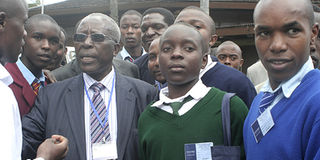Students vote to end reign of school prefects

Education minister Sam Ongeri with students during the second National Secondary Students Leaders Conference at the Bomas of Kenya in Nairobi on Tuesday. The students called for a better national exams grading system. Photo/JAMES NJUGUNA
School prefects are to be phased out and replaced with elected student councils, a conference was told on Tuesday.
Headteachers said prefects promoted a master and servant relationship in schools, and was an undemocratic society.
During the second national secondary schools students leaders’ conference, Kenya Secondary Schools Heads Association boss Cleophas Tirop told more than 1,400 students at the Bomas of Kenya, Nairobi: “Under the new leadership style, members of the council will be allocated extra duties. We will give the students freedom and the responsibility to manage their affairs, and the school’s,” he added.
Unlike the current system of leadership where students are mainly hand-picked by teachers, members of the councils will be elected by fellow students.
In the coming two years, Mr Tirop said, the two systems would work hand-in-hand until the prefects’ system is fully phased out.
President of the student congress, Zarah Mohammed, attacked the political class for failing to address ethnicity and for tearing apart the fibre of the society.
In 2008, a wave of unrest hit secondary schools, leading to closure of about 300 schools.
“I applaud this bold move to engage students in school governance,” Vice-President Kalonzo Musyoka said while opening the conference.
The meeting is organised jointly by the Ministry of Education, the UN and the school heads association.
“When student leaders in particular, and students in general, participate in decision-making, they feel valued,” the VP told the student leaders.
The congress also asked the government to eliminate the huge disparities in performance during national exams. This was after the Nation published a report exposing how a few schools scored top grades while others, especially those in rural areas, performed dismally.
Only 82,000 students — 27 per cent of the total 300,000 candidates who sat the exam — scored grade C+ in the Kenya Certificate of Secondary Education.
Education minister Sam Ongeri said a taskforce led by Education Secretary George Godia was already working to resolve the matter.
He acknowledged that performance was worst in the science-based subjects and efforts were geared towards easing the situation.
Prof Ongeri asked the students to take advantage of electronic and distance learning.
“No student should complain of lacking an opportunity to advance their education now,” he said, referring to the launch of e-learning last week by President Kibaki.
He said the government was in the process of acquiring funding to expand secondary schools.




